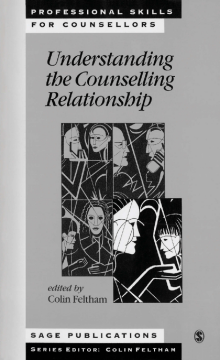
Additional Information
Book Details
Abstract
`This book presents contrasting views of the relationship between the counsellor, or therapist, and the client, as held by practitioners from diverse theoretical orientations. Each chapter clarifies and considers the elements of the counselling relationship which have the most bearing on therapeutic practice and the strengths of each are highlighted in terms of understanding, theory and skills' - New Therapist
It is now widely accepted that the therapeutic relationship - referred to here as the counselling relationship - may be the most significant element in effective practice. Understanding the Counselling Relationship presents contrasting views of the relationship between the counsellor or therapist and the client, as held by practitioners from diverse theoretical orientations.
Each chapter clarifies and considers the elements of the counselling relationship which have most bearing on therapeutic practice. The strengths of each position are highlighted in terms of understanding, theory and skills. The relevance of certain psychological, sociological and research-based issues for practitioners from a variety of theoretical backgrounds are also considered.
`This book presents contrasting views of the relationship between the counsellor, or therapist, and the client, as held by practioners from diverse theoretical orientations. Each chapter clarifies and considers the elements of the counselling relationship which have the most bearing on therapeutic practice and the strengths of each are highlighted in terms of understanding, theory and skills' - New Therapist
`This book is a timely contribution to the debate regarding what makes counselling work as we are forced to consider by purchasers and purveyors of counselling the efficacy of what we offer.... The book has a house style that makes it clear and accessible in the field and raises some interesting and thought-provoking issues' - British Journal of Guidance & Counselling
